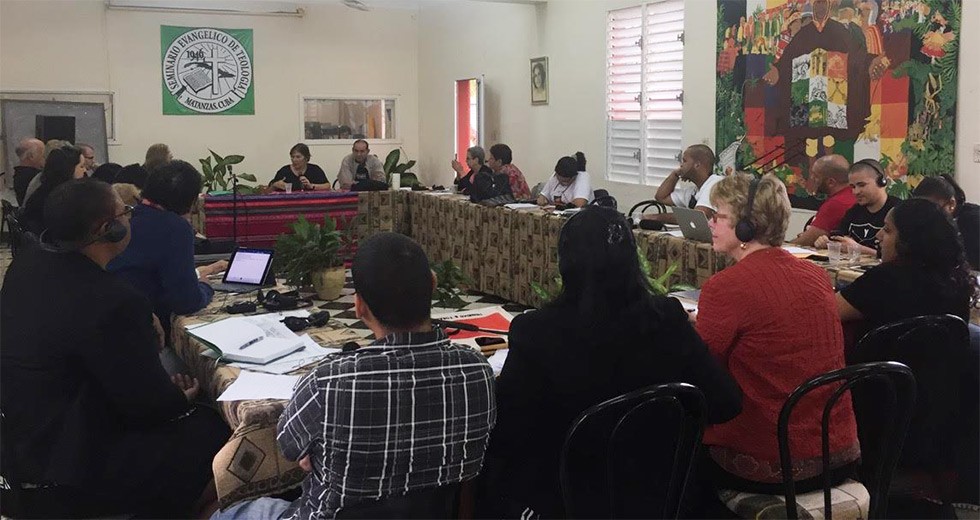Accra+10 consultation in the Americas calls for action
Posted on February 29, 2016 by Phil Tanis

The second bi-regional consultation focused through the Accra Confession took place in Cuba in January. Participants from the Latin America Alliance of Presbyterian and Reformed Churches (AIPRAL) and the Caribbean and North American Area Council (CANAAC) came together under the theme “Gender Reading of the Signs of Times.”
“Our common geographical area of the Americas creates a natural space for conversation in that there are some historical, cultural, economic and political experiences that impinge on each other,” said Yvette Noble Bloomfield of the United Church in Jamaica and the Cayman Islands and WCRC vice president for the Caribbean and North America. “Even though we may be geographically close, there is a rich diversity which we need to respect and celebrate.”
The geographical breadth and diversity of the Americas challenged participants to contextualize their conversations. The Caribbean context where they gathered and from where most participants came was also an essential tool for discussions. These contexts provided participants with the capability to develop concerted conversations between churches of the South and the North about violence, human dignity and respect for the environment.
Both the Accra and Belhar confessions provided a framework through which responses to violence were discerned. A specific passage from each confession was found particularly useful:
Now we proclaim with passion that we will commit ourselves, our time and our energy to changing, renewing and restoring the economy and the earth, choosing life, so that we and our descendants might live. (Accra, article 42)
The Church as the possession of God must stand where He stands, namely against injustice and with the wronged; that in following Christ the Church must witness against all the powerful and privileged who selfishly seek their own interests and thus control and harm others. We believe that, in obedience to Jesus Christ, its only Head, the Church is called to confess and do all these things, even though the authorities and human laws might forbid them and punishment and suffering be the consequence. (Belhar, conclusion of article 4, beginning of article 5)
Six lenses—developed through Bible studies, lectures and learnings—further focused the consultation’s discernment process:
- gender studies as an instrument for empowerment and equity
- the reality of discrimination on the basis of race and origin
- discrimination based on socioeconomic status, poverty and the increasing gap between the rich and the rest of the population
- the correlation between poverty, racism and the undervaluing of women
- manifestations of violence, especially in the lives of women, children and the disenfranchised
- actions to protect and reconstruct the environment
“The Church has to accept that historically, as an institution, there was complicity and participation in the marginalization of persons,” said Bloomfield. “The Church also unfortunately facilitated atrocities by remaining too silent for too long. The Church must now seek to educate and empower persons to become advocates for change and transformation.”
“For too long we have confused our cultural heritage with biblical orthodoxy,” said Shannon Jammal-Hollemans, from the Christian Reformed Church in North America. “This event reiterated for me how much we as the North American Church have to learn from our sisters and brothers in the Global South about what it means to be the Church.”
The consultation “came out with concrete plans and commitments that will improve both regional councils as well as our work globally,” said Dora Arce-Valentin, WCRC executive secretary for justice.
The concluding statement summarized the work of the participants and also called for action:
We are called to a mission of justice that requires from us public and political action. We are called to denounce the unjust systems and to work toward justice and equity, to articulate new models of relationship, and to sojourn with the people for and towards peace. In that walking with the people, we are expected to denounce the way mass media continues to create images that encourage discrimination and the commodification of people. This requires a church leadership that is committed to our Reformed faith and mission and to these projects through local, national and regional acting.
The concluding statement also asks that the WCRC “affirm the essential unity of the Christian Reformed family through concerted efforts toward peace, solidarity, human dignity and creation justice throughout our continents and the world.”
“We have been called to be the salt and the light of the world and that call implies commitments and responsibilities with the community around us,” said Arce-Valentin. “If we don’t take action to make a difference with the world God loves so much, we are just people gathering in buildings named churches.”
 World Communion of Reformed Churches
World Communion of Reformed Churches
Pingback: Cuba conversation with Reformed churches in the Americas | Tumekutana